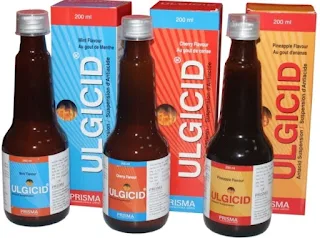Ulgicid Suspension And Tablet Composition, Use, Dose, Side Effect
Ulgicid is an antacid. Antacid neutralizes stomach acid. Some also reduce stomach gas as the case with ulgicid because of its composition. It comes in suspension of three different flavors and a tablet. It is manufactured by Sai Mirra Innopharm Pvt. Ltd., India and manufactured for Prisma Pharma FZE, Dubai, UAE.
 |
| Ulgicid |
Composition Of Ulgicid
Composition Of Ulgicid Suspension
Each 5 ml contains:
Alginic acid BP……200 mg
Magnesium hydroxide BP….250 mg
Dried Aluminum Hydroxide BP 250 mg
Magnesium Trisilicate BP….250 mg
Activated dimethicone BP…125 mg
Approved color used
Composition Of Ulgicid Tablet
Each chewable tablet contains:
Alginic acid BP……200 mg
Magnesium hydroxide BP….250 mg
Dried Aluminum Hydroxide BP 250 mg
Magnesium Trisilicate BP….250 mg
Activated dimethicone BP…125 mg
Approved color used
Read Also: All about Danacid tablet
Description
Ulgicid is best given when symptoms occur or are expected, usually between mealtimes, and at bedtime, four or more times daily; additional doses may be required up to once an hour. Liquid preparations are usually more effective than solid preparations.
Actions And Pharmacology
Alginic acid containing antacid mixtures such as alginic acid, aluminum hydroxide, magnesium trisilicate can be particularly useful in patients with reflux esophagitis.
Activated dimethicone (simethicone): Either alone or with an antacid mixture act as an antifoaming agent to reduce flatulence. It is a silicon polymer that lowers surface tension and allows the small bubbles of froth to coalesce into large bubbles that can be more easily passed up from the stomach or down from the colon. Antacid - simethicone combination may also be useful for the relief of hiccups in palliative care.
Alginic acid: It is combined with antacids to encourage adherence of the mixture to the mucosa. Alginate as mucosal protectant is useful in reflux esophagitis. As the ingredients used in this drug are well established, tolerated and accepted all over the world and hence tests confirming its physiological availability pharmacological effects studies are not conducted.
Pharmacology
Antacids neutralize gastric acidity, resulting in an increase in the pH of the stomach and duodenal bulb.
Pharmacokinetics
Mixtures of alginic acid and antacid, when given orally, react with gastric acid to form a viscous barrier (raft) which floats on the surface of the gastric contents. In vivo, raft formation was significantly better in normal subjects who ingested dilute acid with the labeled alginate/ antacid than in subjects who ingested the labeled alginate/antacid with plain water.
Read Also: All about Polygel suspension and tablet
Gastric emptying of the labeled alginate was also slowed by the presence of acidified gastric contents. These results suggest that the formation of an effective alginic acid antireflux barrier requires acidic gastric contents.
Indications Of Ulgicid
Ulcer and non-ulcer dyspepsia hyperacidity, reflux esophagitis and flatulence.
Contraindications
Ulgicid should preferably not be taken at the same time as other drugs as they may impair their absorption. Antacids may also damage the entire coatings designed to prevent dissolution in the stomach. Most drug interaction can be avoided by taking antacid 2 hrs before or after ingestion of other drugs.
Precautions
Children - Antacids should not be given to young children (under 6 years of age) unless ordered by their medical doctor. In addition, aluminum- or magnesium-containing medicines should not be given to premature or very young children because they may cause serious side effects, especially when given to children who have kidney disease or who are dehydrated.
Older adults-elderly persons with bone problems or with Alzheimer's disease should not use aluminum-containing antacids. The aluminum may cause their condition to get worse.
Adverse Reactions
• Magnesium containing antacids: laxative effect as saline cathartic may cause diarrhea hypermagnesemia in renal failure patients
• Aluminum containing antacids: constipation aluminum intoxication
• Antacids: dose dependent rebound hyperacidity
Interactions
Antacids may interfere with drugs by;
• Increasing the gastric pH altering disintegration, dissolution, solubility, ionization and gastric emptying time.
• Absorbing or binding drugs to their surface resulting in decreased bioavailability.
• Increasing urinary pH affecting the rate of drug elimination
Dosage Of Ulgicid
• One tablespoon (15 ml) twice daily for adults or one teaspoon (5ml) for children twice daily or as directed by physician
• One tablet twice daily or as directed by physician
Overdosage
Aluminum: Bone pain; constipation (severe and continuing); feeling of discomfort (continuing); loss of appetite (continuing), mood or mental changes; muscle weakness; swelling of wrists or ankles; weight loss (unusual).
Magnesium: Difficult or painful urination (with magnesium trisilicate); dizziness or lightheadedness; feeling of discomfort (continuing); irregular heartbeat; loss of appetite (continuing); mood or mental changes; muscle weakness; unusual tiredness or weakness; weight loss (unusual).
Read Also: Best antacid in Nigeria
Treatment Of Overdosage
Check with your medical doctor as soon as possible if any of the following side effects (signs of overdose) occur.
Side Effects Of Ulgicid
Along with its needed effects, a medicine may cause some unwanted effects. Although the following side effects occur very rarely when this medicine is taken as recommended, they may be more likely to occur
• if too much medicine is taken
• it is taken in large doses
• it is taken for a long time
• It is taken by patients with kidney disease
Teratogenicity/effects In Pregnancy
We do not have clinical studies that support the safety of Ulgicid for use during pregnancy; therefore, as with any medication being used during pregnancy, we advise that you consult your physician.

Comments
Post a Comment
Please have your say